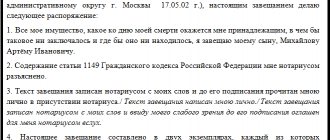Inheritance law gives a person many rights and responsibilities. During the inheritance procedure, a relative of the deceased can receive not only property, but also obligations that one does not always want to comply with, especially if it is aimed at the benefit of other citizens.
Dear readers! To get a free consultation from a lawyer on our portal, write your question in the online consultant pop-up window on the right, or call ext. 801 - free call within the Russian Federation. No queues or spending money - get comprehensive information on your problem within 5 minutes. With the help of an expert, you will understand the issue much faster, trust our experience! It's free.
Testamentary refusal is an important phenomenon in civil law, since it personifies the will of the testator.
The concept of testamentary refusal
The legacy of a will or the so-called legacy dates back to the times of Roman law. Translated from Latin, “legate” is an order or purpose established by the testator in the will. In civil law, testamentary refusal means the will of the testator, by which he imposes on the heirs the obligation to perform certain actions in the interests of third parties.
This order is a unilateral transaction, the main purpose of which is to establish specific obligations to the heirs. At the same time, there is no talk of depriving heirs of the right to inherit.
The current Civil Code allows for the possibility of assigning a legacy to both the legal heirs and those appointed by the will, as well as to other citizens not included in the circle of heirs.
Will: concept and principles
A will is a personal disposition of a citizen’s property in the event of death.
Several features of a will are highlighted: a) a will is a one-sided transaction; b) a will is a fiduciary transaction, and drawing up a will through a representative is not allowed; c) it is not allowed to draw up joint wills of two or more persons; d) a testator can only be a person who is fully capable at the time of its preparation.
In Russia today there are several principles for drawing up a will.
The principle of freedom of testamentary dispositions. An heir under a will can be any individual, as well as legal entities, the state and municipalities, foreign states and international organizations.
The testator has the right to freely determine the circle of heirs, their shares in the inheritance, and may deprive heirs of inheritance by law or make special testamentary dispositions. Individuals do not have to be relatives of the testator. In this case, sub-heirs may be appointed in the event that the appointed heir dies before the opening of the inheritance, does not accept it, refuses it, or is deprived of the right to inherit property. The testator can indicate specific property in the will or not indicate it, making a disposition of the type “all my property that turns out to belong to me on the day of death.” As a general rule, the shares of the heirs, if they are not determined by the will, are equal. Freedom of testament is limited only to ensuring the interests of minors and (or) disabled heirs according to the law of the first priority, as well as the testator’s dependents (Article 1149 of the Civil Code of the Russian Federation).
The principle of secrecy of a will: the testator is not obliged to inform anyone about the existence of a will and its contents, and all persons who participated in the preparation and certification of the will are obliged to keep secret information about the fact of drawing up, amending and revoking the will and its contents. If the secrecy of a will is violated, the testator has the right to demand compensation for moral damage and apply other methods of protecting civil rights provided for by civil law.
The essence of testamentary refusal
The essence of a legacy is the right of the testator to impose a certain obligation on his heirs. The right of a person to a posthumous order is established and guaranteed by Art. 1137 Civil Code of the Russian Federation. This norm describes in detail the principles of operation of the subinstitution, as well as its content, subject, period, sample and procedure for execution.
According to the law, the fulfillment of the assigned obligation is carried out at the expense of the inherited property, the right to which passes to the heirs after the death of the testator.
A legacy can only be established in a will, the form of which must comply with the requirements of the law. Failure to comply with these instructions entails the invalidity of the transaction and, accordingly, the application of all the consequences of its invalidity.
The third party in whose interests the legacy is drawn up is called the legatee (legatee).
Persons who can be the executor and the recipient
The testator can appoint an heir (executor of the will). It becomes one or more people, an individual or a legal entity.
In any case, if the heirs refuse the inheritance (or cannot accept), then it passes to another heir. Inheritance also means the obligation provided for by the will. Accordingly, the new heir is obliged to fulfill the testator's demand. If the heirs, by law or by line, refused to receive the inheritance and it passed into the state fund, then the latter must fulfill the will of the deceased. For example, the grantor ordered that his dacha be transferred to the city museum fund for the development of a new department. The state must designate this building as a legatee fund. This is discussed in detail in Article 1140 of the Civil Code of the Russian Federation.
The legatee can be any person, including an heir by law or by will.
Video: in what cases can you refuse an inheritance?
Legislative regulation of legal relations arising during the implementation of a legacy
Legal relations between heirs and legatees are regulated by the section of the Civil Code of the Russian Federation devoted to the proper fulfillment of obligations between creditors and debtors. Only the person who has legal grounds to do so has the right to demand from the heirs the transfer of certain benefits.
The legatee has the right to receive a waiver only after the heirs have entered into the right of inheritance. An heir who has not accepted the inheritance is not obliged to implement the legacy established by the testator.
Do you need the help of an inheritance lawyer?
Sign up for a consultation with the practice manager
+7
Subject of testamentary refusal
A complete list of material and intangible benefits that may be the subject of a testamentary refusal is provided in paragraph 2 of Art. 1137 Civil Code of the Russian Federation. It should be noted that the subject of a legacy can be both the transfer of ownership and the right to possess certain property, as well as the performance of certain services or the transfer of property rights.
The transfer of the right to own a thing to the recipient does not provide for the possibility of disposing of it. Property can be disposed of only in the event of a transfer of ownership, which is provided for in the will, which contains a legacy.
So, the subject of a testamentary encumbrance can be:
1. The obligation established by the legate to make periodic or one-time cash payments in favor of a third party (legatee);
2. Transfer to the legatee of the right to own property;
3. Providing the recipient of the refusal with services specified by the legate;
4. Carrying out a number of works in the interests of the legatee;
5. Transfer of ownership of movable and immovable property to the legatee;
6. Transfer to the legatee of the right to use a certain thing. Use refers to the right to own a thing and extract useful properties from it;
7. Implementation of other obligations imposed by the testator on the heirs of the legate.
If the subject of the legacy is the transfer to the legatee of the testator's obligations to creditors, the fulfillment of the waiver is carried out at the expense of the inheritance. The recipient of the refusal is not liable for the debts of the testator, which is fundamentally different from the heirs, since the latter, along with the rights of the testator, also receive his obligations.
What orders may the testator have?
A testamentary assignment may apply to both property and non-property obligations.
A citizen can give the following orders:
- The need to take care of his pets if the heir is given the property in which they lived.
- The need to complete repairs or construction.
- Transfer cultural and material values into the ownership of the museum, open the museum yourself (for example, in one of the rooms) or open a memorial plaque or monument using inherited funds. This also includes the transfer of religious objects to churches.
- Stop leading an immoral lifestyle: do not drink alcohol or drugs, undergo treatment.
- Transfer bequeathed property to the heir when he reaches a certain age, for example, after graduating from university.
It is worth noting that other instructions are also possible: for example, if a summer cottage goes to a son, the will may indicate that the daughter also has the right to use it and come on vacation.
It is important to remember that the testator does not have the right to set conditions that interfere with the personal life of the heir: for example, the requirement to renounce marriage, religion, spouse, etc.
But the requirement to give up bad habits can be prescribed, since they cause harm not only to the heir, but also to his family and environment, that is, the imposition is socially useful.
Legate form
Since the legacy is established in the will, the requirements for the form of its preparation are similar to those put forward in relation to the will itself.
A will with a testamentary disclaimer is drawn up in writing, therefore the oral form of expressing the posthumous order of the testator is not the basis for legal consequences. In addition, a mandatory condition for the validity of a document is its notarization.
When making a will equivalent to a notarized will, which contains a legacy, officials have the right to certify the will of the testator.
A testamentary refusal must be established in the will. A legacy established in a will that is not certified by either a notary or an authorized official has no legal force, as does the entire transaction.
Contents of the testamentary refusal
Since the mandatory appointment of heirs is not required to establish an encumbrance, the contents of the will can only constitute a testamentary refusal. In this case, inheritance is carried out according to the law, and the obligation to fulfill the posthumous order of the testator falls on the heirs who have entered into the right of inheritance.
Recently, cases of establishing a legacy have become more frequent, the subject of which is to assign to a person who is not an heir the responsibility for organizing funeral services related to the death of the testator. Although the list of items of testamentary refusal established by Art. 1137 of the Civil Code of the Russian Federation, obligations of this kind are not included; they do not contradict the requirements of the law, and therefore are permissible.
When certifying a will, the contents of which provide for the fulfillment of any obligation that does not contradict the law, the notary is obliged to explain to the testator that the provision of the service will be carried out at the expense of funds from the estate, and also, if possible, provide a sample of such an encumbrance.
Testamentary refusal and testamentary assignment: similarities and differences
Testamentary refusal and testamentary assignment are the burdens of the testator established in the will. They are aimed at carrying out certain actions. Despite the general nature of these two concepts, there are a number of differences between them, including:
- The concept of “testamentary assignment” presupposes non-property encumbrances. For example, when the testator assigns responsibility for caring for a pet;
- the person to whom the assignment is intended is not specified. The obligation falls on all heirs who have entered into the right of inheritance, in proportion to their shares in the inheritance. In turn, the right to receive a testamentary refusal applies to certain persons, the list of whom is established by the will.
Definition of the concept of “testamentary assignment”
A testamentary assignment is one of the types of additional testamentary dispositions (along with a testamentary refusal).
A testamentary assignment is an instruction contained in a will that entrusts certain heirs with the performance of certain actions (for example, maintaining the pets left behind).
A testamentary assignment is a type of testamentary disposition that imposes on one or more heirs by will or by law the obligation to perform any action of a property or non-property nature, aimed at achieving a generally beneficial purpose or at achieving another goal that does not contradict the law, including the action of burying the testator in accordance with his will (Article 1139 of the Civil Code of the Russian Federation).
The same obligation may be assigned to the executor of a will, provided that a part of the inherited property is allocated in the will for the execution of the testamentary assignment.
Thus, a testamentary assignment may extend:
- to heirs under a will;
- to heirs by law;
- on the executors of the will (executors), subject to the allocation in the will of a part of the inherited property for the execution of the testamentary assignment.
Testamentary assignment from 09/01/2018
Please note that until September 1, 2021, in paragraph 1 of Article 1139 of the Civil Code of the Russian Federation, a testamentary disposition was understood as imposing an obligation to perform actions of a property or non-property nature aimed at achieving a generally beneficial purpose.
From 09/01/2018, this norm was supplemented with the following words:
“or for the implementation of another purpose that does not contradict the law, including the burial of the testator in accordance with his will.”
Even before the adoption of these amendments, it was noted in the literature that the generally beneficial purpose of such an assignment, despite its purely private nature, is expressed in the traditional sense of respect and moral duty in a developed society in relation to the will of the testator to rest in a certain way.
What is the generally beneficial purpose of a testamentary assignment?
The law does not provide the concept of a “generally beneficial purpose”; accordingly, this concept is evaluative. These goals can be understood as:
- social, charitable, cultural, educational, scientific and management purposes;
- the goals of protecting the health of citizens, developing physical culture and sports, satisfying the spiritual and other non-material needs of citizens, protecting the rights and legitimate interests of citizens and organizations, resolving disputes and conflicts, providing legal assistance;
- other goals aimed at achieving public benefits (Article 2 of the Federal Law of January 12, 1996 N 7-FZ “On Non-Profit Organizations”).
The generally beneficial purpose, depending on the circle of persons in whose interests the testamentary assignment is established, can be understood as:
- a goal useful for society and the state as a whole (cultural, charitable, educational, scientific and similar goals);
- a goal useful for a certain circle of people with an indefinite number of people or a separate social group (persons of a certain profession, pensioners, people living in a certain area, etc.). An example is the imposition on the heir or executor of the obligation to transfer funds in favor of any category of seriously ill people to the appropriate medical institution or fund for helping such patients). Another example would be providing financial support to students of an educational institution.
But, for example, imposing the obligation to transfer funds in favor of a specific medical institution (for example, Central Bank No. 1 of Kaluga), or a specific higher educational institution (for example, Lomonosov Moscow State University) will be an example of a testamentary refusal, and not an assignment, since the beneficiary is clearly defined (a specific hospital and a specific university).
The difference between a testamentary assignment and a testamentary refusal
Testamentary assignment:
- goal: the implementation of a generally beneficial goal or another goal that does not contradict the law;
- the subject to whom the results of the actions are intended: an indefinite number of persons, a specific beneficiary is not indicated;
- involves the implementation of actions of both a property and non-property nature
- implies the possibility of appointing not only heirs, but also other persons (executor of the will) as executors of a will, provided that a portion of the inherited property is allocated in the will for the execution of the testamentary assignment
- The validity of the right to demand the execution of testamentary contributions, the subject of which are actions of a non-property nature, is not limited to a three-year period (clause 2 of Article 1139 of the Civil Code of the Russian Federation).
Testamentary refusal:
- purpose: providing property benefits to a specific person;
- the subject to whom the results of the actions are intended: a specific person – the beneficiary;
- involves the implementation of actions of a property nature only.
- implies the possibility of appointing only heirs as executors of a will
- the validity of the right to demand execution of a testamentary refusal is limited to a three-year period
What rules on the execution of a will apply to the assignment
To a testamentary assignment, the subject of which are actions of a property nature, the rules of Art. 1138 of the Civil Code of the Russian Federation on the execution of a testamentary refusal:
“The heir, who is entrusted by the testator with the obligation to perform an action aimed at achieving a generally beneficial goal, must fulfill it within the limits of the value of the inheritance passed to him minus the debts of the testator attributable to him.
If the heir who is entrusted with the specified actions has the right to an obligatory share in the inheritance, his obligation to fulfill the assignment is limited to the value of the inheritance transferred to him, which exceeds the size of his obligatory share.”
If the testamentary assignment is not executed voluntarily
If a testamentary assignment is not voluntarily executed, then interested parties have the right to demand execution of the assignment in court. In this case, the following have the right to go to court:
- interested parties (which may include any persons in whose favor these actions are performed; non-profit organizations authorized to act in defense of public organizations, as well as state authorities and local governments whose competence includes the implementation of any activity aimed at achieving those goals) or similar generally useful purposes);
- executor of the will;
- any of the heirs, unless otherwise provided in the will.
The right to demand the execution of a testamentary assignment, the subject of which is actions of a property nature, is valid for three years from the date of opening of the inheritance.
From paragraph 2 of Art. 1139 of the Civil Code of the Russian Federation it follows that the legal regime established for testamentary refusal does not apply to testamentary assignment, the subject of which is actions of a non-property nature. The following does not apply to such testamentary assignments:
- the rule on their execution only within the limits of the value of the inherited property received;
- the validity of the right to demand the execution of such testamentary assignments is not limited to a three-year period.
Transfer to other heirs of the obligation to fulfill the testamentary assignment
The obligation to execute a testamentary assignment for the heir arises only if he accepts the inheritance.
If the share of the inheritance due to the heir who was entrusted with the obligation to fulfill the testamentary assignment passes to other heirs, the latter are obliged to fulfill such assignment, unless otherwise follows from the will or law (Article 1140 of the Civil Code of the Russian Federation).
The obligation to fulfill the testamentary assignment passes along with the inheritance share to other heirs if they accept the inheritance:
- by right of representation (Article 1146 of the Civil Code of the Russian Federation);
- in the order of hereditary transmission (Article 1156 of the Civil Code of the Russian Federation);
- as a result of the heir’s refusal of the inheritance in favor of another heir from among the heirs by will or heirs by law (Articles 1157, 1158 of the Civil Code of the Russian Federation) and the acceptance of the inheritance by this heir (Article 1161 of the Civil Code of the Russian Federation);
- as a sub-designated heir (another heir indicated in the will in case the heir at law or the named heir in the will dies, or does not accept the inheritance, or refuses it, etc.) (Articles 1121, 1161 of the Civil Code of the Russian Federation);
- as escheated property (transfers by inheritance by law into the property of the Russian Federation, constituent entities of the Russian Federation or into the property of a municipal entity in the event that there are no heirs both by law and by will, or none of the heirs have the right to inherit, or none of the heirs accepted inheritances, etc. (Article 1151 of the Civil Code of the Russian Federation).
Imposition of responsibility for maintaining the testator's pets
A type of testamentary assignment is the provision of paragraph. 2, paragraph 1, Article 1139 of the Civil Code of the Russian Federation, according to which the testator also has the right to impose on one or more heirs the obligation to maintain the testator’s pets, as well as to provide the necessary supervision and care for them.
The position of the legislator is apparently based on the fact that the responsibilities for keeping, supervising and caring for domestic animals are both property and non-property and are aimed at achieving a generally beneficial goal.
It is believed that the generally beneficial goal in this case is to satisfy the social need for humane treatment of animals. Another opinion is that one of the results of these actions is a reduction in the number of stray animals that spread various infections and pose an obvious danger to society as a whole and its individual members).
The disadvantages of this rule of law are the difficulty of implementing a testamentary assignment in the absence of the heir’s desire to take care of the testator’s animals. Execution of the will of the testator (without legal consequences for the heir or executor of the will) may not be executed due to the following:
- the legislation does not regulate the legal mechanism for imposing duties on keeping, supervising and caring for pets;
- the law does not have a system for monitoring the execution of the testator’s orders obliging him to keep his pets and provide the necessary supervision and care for them (the law does not name either the bodies or persons responsible for monitoring the fulfillment of such duties by the heir);
- The law does not provide for liability measures for heirs or executors of a will for failure to fulfill or improper performance of their duties in relation to pets. This state of affairs provides the heirs with ample opportunities to evade the fulfillment or improper performance of the duties assigned to them, and therefore the expectations of the testators risk being unrealized.
In what case is a testamentary assignment an encumbrance on property?
A testamentary assignment may be an encumbrance on the rights of heirs in relation to certain property. The contents of the testamentary assignment must be specified in the certificate of the right to inheritance issued to the heir obligated under such assignment. However, if the testamentary assignment does not encumber specific property, or by the day the certificate of the right to inheritance is issued, the assignment has been fulfilled, the certificate of the right to inheritance is issued without instructions on the assignment.
Alexander Otrokhov, 10/03/2018
Deadline for receiving the legate
Within 3 years after the death of the testator who left the legacy, third parties in whose favor it was drawn up have the right to use the benefits provided by him. When the three-year period has expired, the testamentary refusal loses its legal force, as a result of which the legatee, who did not declare his right in time, will no longer be able to use it. Accordingly, the heir is released from the obligation to fulfill the legacy (clause 3, article 1138 of the Civil Code of the Russian Federation).
To avoid this, the testator can indicate another legatee in the will, that is, sub-designate the beneficiary of the refusal. The sub-appointment is carried out so that the second legatee can take advantage of the testamentary refusal in the following cases:
- in the event of the death of the legatee before the opening of the inheritance;
- death of the legatee at the same time as the testator;
- renunciation of the legatee's right to receive a legate;
- if the recipient of the refusal was unable to take advantage of the benefits provided to him as a result of missing the three-year period established by law;
- recognition of the legate as an unworthy heir.
Relinquishment of inherited property in someone else's favor
Any citizen who receives it has the right to refuse an inheritance. The reason for this is most often the receipt of debts of the testator in addition to the inherited property. Also, the successor may abandon the property in the interests of other heirs who lay claim to it.
Without declaring himself within 6 days, the potential heir no longer claims the inheritance, and his share is evenly divided among the remaining people claiming rights to the property.
Grounds for a legatee’s refusal to receive a legate
The right of a legatee to refuse to accept a legacy is guaranteed by Art. 1160 Civil Code of the Russian Federation. This standard provides:
- inadmissibility of using coercive measures against the legatee;
- free disposal by the legatee of his subjective rights.
A refusal in favor of another citizen or subject to prohibition by law may be declared invalid by the court at the request of interested parties. If the legatee refuses to accept the legacy, the obligation of the heirs to fulfill it ceases.
The exception is cases when the testator has appointed in the will another legatee, in whose favor the testamentary refusal is executed.
The right to use residential premises by testamentary refusal
The most popular subject of testamentary encumbrance is the transfer to the legatee of the right to use residential premises or a separate part thereof.
Features of the right to use housing on the basis of a legacy:
- the use of residential premises provided by testamentary refusal is established both for the entire life period of the legatee, and for a certain period, regardless of the change of owner of this housing;
- the Housing Code of the Russian Federation states that the legatee bears joint and several liability with the legal owner for obligations related to the use of housing arising during the validity of the legate;
- the legatee may require state registration of his right. It should be noted that due to the lack of an appropriate mechanism, registration of the legatee’s right to use property often raises many questions.
An example of such an encumbrance: the testator bequeaths a house or apartment to a minor child, but at the same time establishes a legacy in the will.
The subject of the legacy is to grant the testator's wife the right to lifelong use of this property. Proper execution of a will provides housing for both the child and the wife of the testator, excluding the possibility of an unfavorable development of the situation after the death of the latter.
Problems arising when implementing a testamentary refusal
After the death of the testator, the legatee, subject to the presence of a refusal in the will, receives from the notary the relevant title documents confirming his right to material or intangible benefits defined in the text of the will.
According to notarial regulations, such a title document may be a certificate of the rights of the legatee.
However, in practice, many legatees are faced with the problem of notaries refusing to issue such a document, who justify their actions by the presence of relevant information in the certificate of inheritance.
This state of affairs is often an obstacle for the recipient of the refusal to exercise his right, since its use depends entirely on the heir and on whether he will enter into the right of inheritance or not.
In cases of controversial situations regarding such an encumbrance, namely its non-fulfillment or improper fulfillment, the recipient of the refusal has the right to defend his rights in court.
Also, the person appointed as the recipient of the refusal may demand compensation from the heirs for losses incurred by him. Moreover, the amount of claims does not depend on the value of the inheritance. The statute of limitations within which a claim can be filed is 3 years.
Author of the article
Execution of a will
While establishing general rules for the execution and procedure for making a will, the law imposes a number of special requirements for the execution of a closed will, a will in emergency circumstances and testamentary disposition of rights to funds in banks.
An absolute novelty of the Civil Code of the Russian Federation in 2001. is a closed will. The main purpose of establishing this form of will is to ensure the most complete preservation of the secrecy of the testamentary disposition. A closed will is drawn up and signed by the testator with his own hand, and handed over to the notary in a closed envelope, while no one, including the notary, is notified of the contents of the will. For a closed will to be valid, it must be deposited with a notary by performing a number of actions: a) transferring to the notary in the presence of two witnesses a sealed envelope with the will; b) affixing the signatures of two witnesses on the envelope; c) sealing by a notary of the envelope with the will into another envelope in the presence of the same witnesses; d) the notary makes an inscription on the second envelope about the acceptance of the will (the inscription includes information about the testator, the place and date of acceptance of the will, the names and places of residence of witnesses); e) an explanation to the testator of the rule on the right to an obligatory inheritance (Article 1149 of the Civil Code of the Russian Federation), indicating this on the envelope; f) acceptance of a closed will for storage with the issuance to the testator of an appropriate document confirming the fact of acceptance of the closed will.
Execution of a closed will occurs after its opening. The autopsy is performed no later than 15 days after the notary receives the death certificate of the testator in the presence of two witnesses and interested persons from among the legal heirs who wish to be present. After opening, the notary reads out the text of the will, draws up a protocol certifying the opening of the envelope, which is signed by the notary and two witnesses, and gives the heirs a notarized copy of the protocol. The original will and protocol are kept by the notary.
A will in emergency circumstances is a forced measure of the Russian legislator. This form of will is designed for increasingly frequent cases of hostage-taking, for situations in conditions of accidents, catastrophes, natural disasters, when there are circumstances that threaten the life of a person, depriving him of the opportunity to draw up a will in a notarial or other form provided for by law. Such a will can be drawn up in simple written form by the testator in his own hand in the presence of two witnesses. Such a will is subject to execution only after it has been established that the will was executed in emergency circumstances (Articles 264-268 of the Code of Civil Procedure of the Russian Federation). However, if within a month after the termination of the emergency circumstances, the person does not make a will in any of the forms specified above, the will drawn up in emergency circumstances shall become invalid.
A testamentary disposition of rights to funds in a bank has the force of a notarized will.
In the event of death, a citizen has the right to dispose of the rights to funds held in banks and other credit institutions by drawing up a will according to the general rules established by Articles 1124-1127 of the Civil Code of the Russian Federation, or by making a special document - a testamentary disposition.
The main legal requirement for a testamentary disposition is that it must be made in the bank where the corresponding account is located.
The subject of a testamentary disposition may be rights to funds:
- Contributions made on the basis of a bank deposit agreement (Article 834-844 of the Civil Code of the Russian Federation). In this case, the type of deposit (demand deposit, time deposit) does not matter.
- Located in foreign currency, current and other accounts in banks and other credit institutions on the basis of a bank account (Article 845-860 of the Civil Code of the Russian Federation).
A testamentary disposition must be made in writing with
indicating the date of its preparation, signed by the testator in his own hand and certified by a bank employee who has the right to accept for execution the client’s orders regarding the funds in her account.
The execution of a testamentary disposition of rights to funds in banks is carried out in accordance with the general rules of inheritance.
Funds are issued to heirs depending on the specific case based on:
- Certificates of the right to inheritance by will or by law, issued by a notary or consular official of the Russian Federation;
- Notary decisions on compensation of expenses caused by the death of the testator;
- A certificate issued by a notary to the executor of the will;
- Certificates of ownership of a share in property jointly owned by spouses, issued by a notary or consular officer of the Russian Federation;
- Copies of a court decision with a note on its entry into legal force or a writ of execution in the event of a judicial review of the case.









